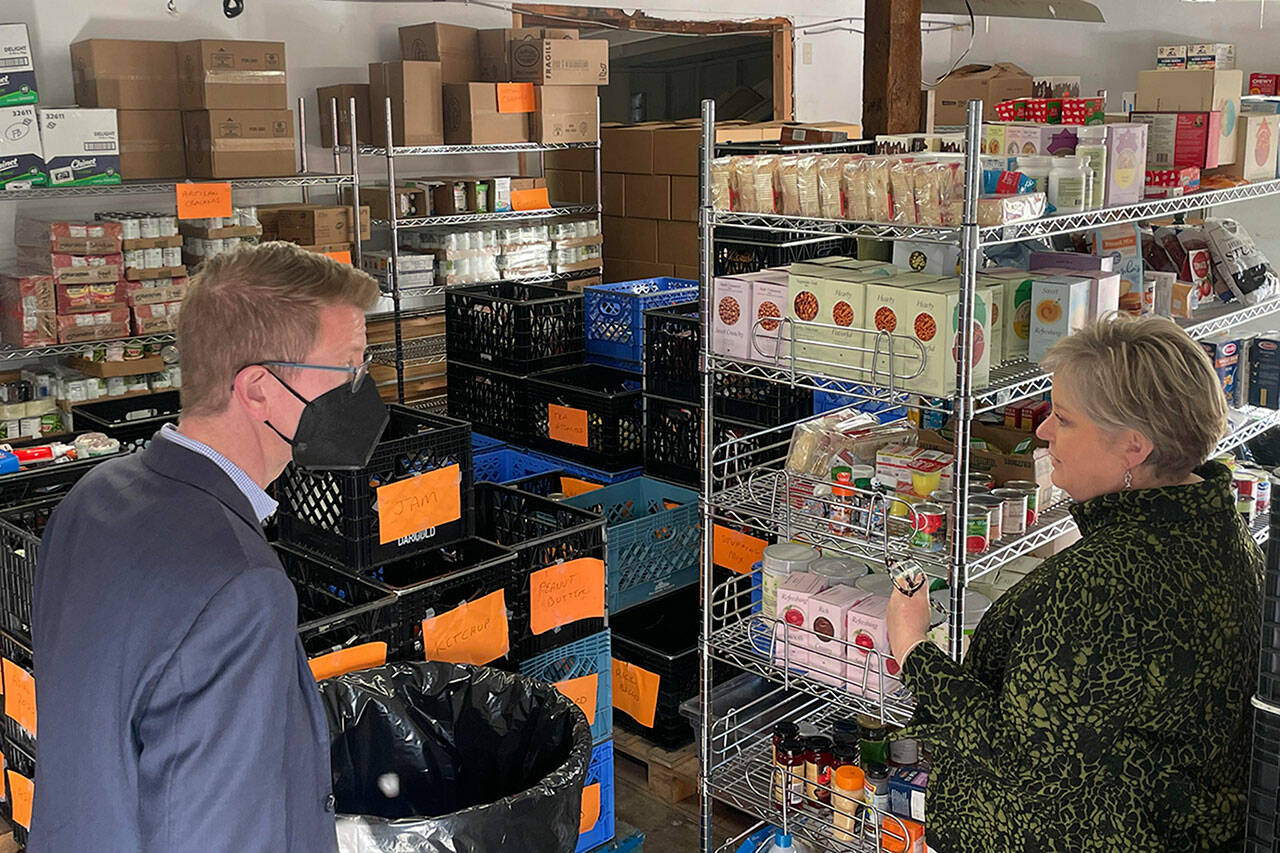Unallocated American Rescue Plan Act dollars may have to be returned to the federal government as a condition for raising the U.S. debt ceiling, U.S. Rep. Derek Kilmer told Clallam County commissioners on Feb. 10.
Kilmer, a Gig Harbor Democrat who represents six counties across the Olympic Peninsula, was in Clallam County last week to visit recipients of ARPA dollars and highlight the impacts of the relief package.
The county received more than $15 million in ARPA funds, most of which has already been allocated to various projects throughout the county.
While most of Clallam County’s ARPA dollars have been distributed, county commissioner Mark Ozias said about $1.3 million remains unallocated.
Kilmer told commissioners that Republicans in the U.S. House of Representatives had suggested taking back unallocated ARPA funds as a condition for agreeing to raise the nation’s debt ceiling.
“I don’t think that’s a good idea and certainly I think communities are dealing with the effects of the pandemic,” Kilmer said, “but it’s on the table. As the county contemplates what to do, it is not a zero risk to leave those unallocated.”
The Associated Press reported last month that the U.S. Treasury Department has taken measures to keep the government running through at least June.
“We have many more requests than what we have funding for,” Clallam County commissioner Randy Johnson said.
“The congressman is right; it’s a concern, but I don’t think we have a concern about allocating the money to a whole lot of needy projects.”
Johnson said housing projects and the Sequim Food Bank were top priorities for remaining ARPA funds.
Kilmer was joined by Commissioners Johnson and Ozias to tour ARPA recipients, including Peninsula Behavioral Health’s supportive housing project at the old All View Motel in Port Angeles which is currently under renovation.
“One of the benefits of having the ARPA dollars when we did is it allowed us to help Peninsula Behavioral Health be really opportunistic to take advantage of an opportunity,” Johnson said in the parking lot of the former motel on Lauridsen Boulevard.
“It wouldn’t happen without ARPA dollars,” Johnson said.
Both the City of Port Angeles and Clallam County each contributed $337,500 in ARPA funding to the project which will provide 25 units of affordable housing for formerly homeless people. The additional funding has helped cover additional costs to the project following burst water pipes during a cold snap in December 2021.
Residents will hopefully be able to move in about mid-April following the acquisition of an occupancy permit from the city, according to Shanna Bloom, Peninsula Behavioral Health financial controller.
The entire cost of the project is about $4.9 million, Bloom said. It has been funded through a combination of local, state and federal dollars as well as local community donations.
“We really want to get this up and running to show the community that we can run it with good results,” Bloom said.
More efforts
Also on Feb. 10, Kilmer visited the Boys & Girls Club of the Olympic Peninsula’s Port Angeles branch which received $60,000 in ARPA funds for child care support; the Sequim Food Bank, awarded $185,950, and Clallam County Public Utility District, which received $350,000.
Nicole Hartman, spokesperson for Clallam PUD, said the ARPA funds will be applied towards utility arrearages for customers affected by the COVID-19 pandemic.
“Customers who were affected applied with the utility to receive assistance on their past due amounts,” she said.
“We are also slated to receive another $750,000 to assist with water projects in Carlsborg. We have not received this funding yet, nor has construction begun.”
Sequim Food Bank executive director Andra Smith told Kilmer that along with other federal funding, ARPA funds helped the food bank purchase a new, larger delivery truck, rent three storage containers and eventually buy two of them, and add equipment, such as a forklift.
“We quickly realized we didn’t have what we needed to do this,” she said about the early portion of the pandemic.
Smith said “many people were experiencing food insecurity for the first time,” and now they’re seeing more elderly people seeking assistance as general costs of living go up.
Ozias, the Food Bank’s former executive director prior to being voted a county commissioner, said visits went up significantly during the pandemic.
“[The Food Bank] was operating at a much higher level all around and what we’re seeing is that the need is not temporary,” he said.
Ozias reiterated Johnson’s sentiment that the Sequim Food Bank is a place they’re looking to use unappropriated ARPA dollars to help it add storage.
“This organization spent an extra $165,000 above [its normal spending] to meet the need as access to normal food channels were decreasing,” he said. “Now we’re looking at how we can sustain this organization at such a high level.”
Smith said their additional storage will be built in phases and on property adjacent to its 144 W. Alder St. facility.
Additional funding for more county projects may be available through federal community project grants, formerly known as earmarks, which were recently revived by Congress after being suspended for more than a decade.
House Republicans have committed to keeping the grants, Kilmer told PDN, but how many projects might be allowed per district hasn’t been set.
Kilmer said those funds would not be available until next year, but urged county officials to submit applications for the funding as soon as possible.
“Last time we had 125 applications for 15 slots,” Kilmer said of the grants. “The new majority hasn’t announced how many slots would be available, how many projects we can put forward. My hope is that we continue to be able to get federal resources.”



